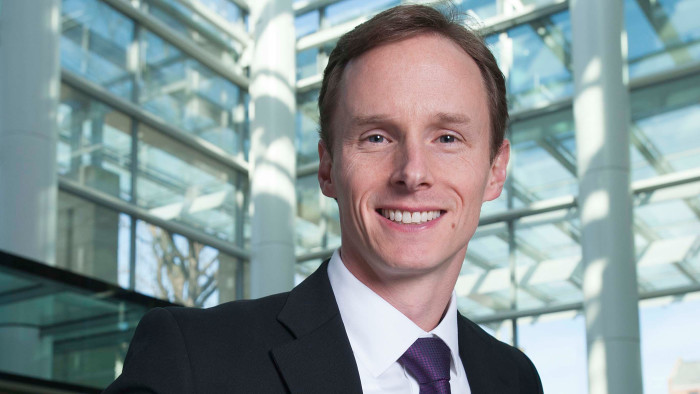Scott DeRue of Ross School of Business is more student than head

Roula Khalaf, Editor of the FT, selects her favourite stories in this weekly newsletter.
You know you are getting old when all the policemen appear younger than yourself. Looking at Scott DeRue, who has just taken charge at the University of Michigan’s Ross School of Business, I get the same feeling about US business school deans.
The institution’s 40-year-old management professor, award-winning researcher and “favourite son” arrives for our interview in a navy-blue suit and crisp white shirt looking more like a student than the head of one of the world’s top business schools.
Perhaps this is why Prof DeRue is able to claim such good relations with students and faculty alike at Ross, evidenced by his previous nominations for numerous 40 under 40 lists of academics, a ranking of the most influential young people to watch.
“I was hired because I have the relationships and the appreciation and the culture at the University of Michigan and, in particular, the Ross school,” he says, noting that he owed his appointment in part to backing by fellow teaching staff.
“I have the ability to bring people together in a world of academia, which is not always easy to do.”
Prof DeRue, who comes from the tiny North Carolina town of Wallburg, claims to be driven by the Ross mission to develop leaders who make a difference in the world. In his LinkedIn profile, he describes himself as “living life with purpose and passion”, something he proved in 2013 by climbing Mount Everest.
“I am a very empowering person and I want to hire great talent and empower them to do a great job,” he says. “When we have a shared understanding of where we’re going I have no doubt that our faculty and our staff, when we come together, will be able to deliver on that.”
Despite his relatively young age, Prof DeRue is a long-standing member of Ross’s faculty staff and has already held several senior roles at the school. During his tenure as associate dean of executive education, Prof DeRue led the programme to its best performance in a decade, expanding its portfolio to more than 30 open enrolment and dozens of custom courses.
He also helped create Alumni Advantage, an initiative to strengthen the bond between former Ross students and the school with offers such as free tuition on executive education courses. He launched the Sanger Leadership Center to provide leadership training to all 3,400 current students.
“The way that organisation is managed is a perfect illustration of what I mean by empowerment,” Prof DeRue says. “We want to create transformational leadership development experiences for our students that demonstrate for them the power of business to create value for customers, create value for shareholders, create great places to work for employees and create value for our communities at large.”
One challenge will be to match the fundraising talents of his predecessor Alison Davis-Blake, who, during her five-year term as dean, helped Ross raise more than $305m towards the school’s capital campaign.
Prof DeRue says he should be judged after completing his planned 10 years in office, spread over two terms. “If the university decides it doesn’t want me after five years then so be it,” he says. “But when I think about building this organisation for the future I don’t think about five years, I think about a decade and beyond.”
One of the ways Prof DeRue feels he can make a difference is to build programmes like the masters in management degree. Ross, which started offering this course in 2013, is one of the few top US schools to offer the masters in management qualification, which is far more prevalent in Europe.
Although it is early days for the programme at Ross, Prof DeRue sees the masters in management degree as a gateway to attracting students with liberal arts degrees.
“We’ll get students in the arts who want to open a gallery, all the way to the person who wants to work in the bank, but wanted to study history as an undergraduate,” he says.
“Before the masters of management, in the US in particular there wasn’t anything for that student,” he adds, noting that 93.5 per cent of those who have completed the programme have found jobs within three months.
“That’s a world class career placement stat.”
Prof DeRue joined Michigan State University in 2003 shortly after his 27th birthday, initially as an instructor on leadership skills to undergraduates and MBA students.
Before that he had five years in corporate life, working in private equity, investment banking and as a marketing executive for a luxury yacht builder.
He majored in management studies only after realising that he lacked the scientific knowledge to gain a place on the premedical course during his undergraduate studies at the University of North Carolina at Chapel Hill.
“I wanted to be a doctor at a very early age, right up until that first biology class, then I couldn’t find the business school fast enough,” he says, adding that he secured the second best option by marrying a doctor.
But Prof DeRue insists that despite not following a medical career, his academic work still allows him to change lives for the better.
“If you think about it, higher education has been one of the most successful social experiments in world history, in terms of driving social mobility, in terms of building productive citizens, advancing society and how we work together,” he says.
Comments